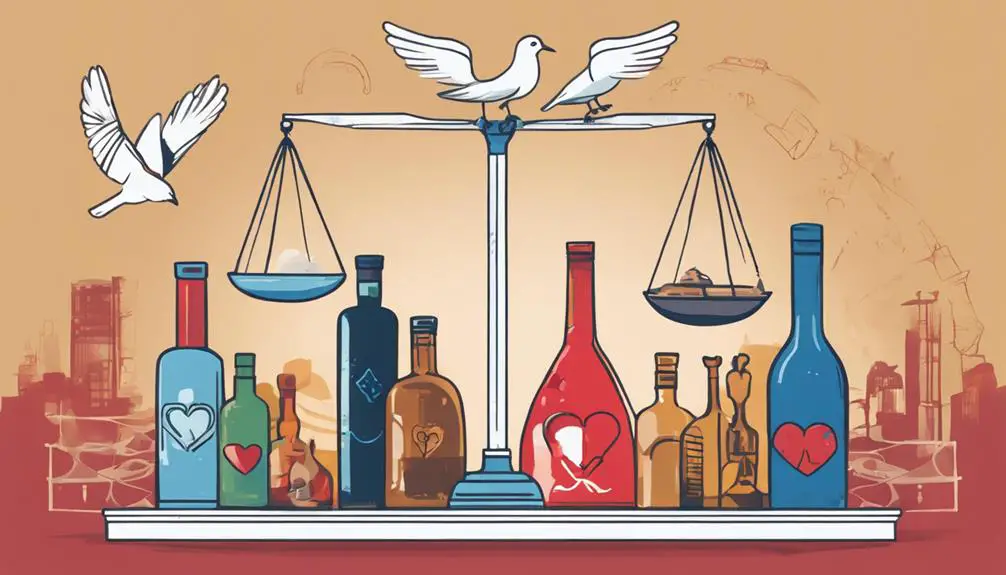Balancing ethics and economics, owning a liquor store poses a moral dilemma that intertwines personal beliefs and societal impacts—what's your stance?

Is Owning a Liquor Store a Sin?
Did you know that over 15,000 liquor stores across the U.S. contribute significantly to the economy?
Now, you're possibly pondering whether owning one of these establishments treads into the realm of sin.
Various religious doctrines have long debated the morality of alcohol, painting a complex picture of where liquor sales fit in the broader ethical landscape.
As we explore the intersection of sin, business, and societal impact, you'll find compelling arguments on both sides that challenge conventional wisdom.
This conversation promises to shed light on how deeply personal and societal values influence our views on commerce and morality.
Key Takeaways
- Various religions have differing views on alcohol, impacting the ethical considerations of owning a liquor store.
- Ethical business practices require balancing profit with responsibility towards community well-being and customer health.
- Owning a liquor store can align with moral duties if it encourages responsible consumption and minimizes harm.
- The morality of owning a liquor store depends on aligning business operations with ethical principles and societal impact considerations.
Understanding Sin and Business

To discern whether owning a liquor store is sinful, it's crucial to examine scriptural teachings, ethical implications, and doctrinal stances on business and morality. Scripture doesn't directly address modern business practices, but it does offer guidance on ethics, profit motives, and adherence to legal regulations. You're called to act justly and love mercy, balancing the pursuit of profit with the well-being of your community.
Profit motives, when not tempered by ethical considerations, can lead to exploitation and harm. You're reminded that wealth gained hastily can dwindle, but gathering it little by little will increase it (Proverbs 13:11). This suggests that how you make your money matters as much as the amount you make. Moreover, legal regulations are in place not just for public order but often to protect the vulnerable. Romans 13:1 encourages you to be subject to governing authorities, implying that legal compliance in business isn't just a legal requirement but a moral obligation.
Owning a liquor store requires you to navigate these principles carefully. You must consider whether your business practices align with scriptural calls for justice, compassion, and adherence to the law. Reflecting on these aspects will help you determine the moral standing of your business venture.
Religious Perspectives on Alcohol
Reflecting on the moral aspects of business, it's also important to consider how various religions view the consumption and sale of alcohol. Different faiths have distinct doctrines and scriptural references that guide their stance on alcohol consumption. For some, the history of prohibition within their religious context deeply influences current attitudes towards alcohol.
Religion |
Stance on Alcohol Consumption |
Scriptural Reference |
|---|---|---|
Christianity |
Varies; some denominations prohibit, others allow in moderation |
Ephesians 5:18 ("Do not get drunk on wine…") |
Islam |
Strictly prohibited |
Quran 5:90 ("Intoxicants and gambling…are an abomination of Satan's handwork.") |
Buddhism |
Discouraged |
Fifth Precept (Refrain from intoxicating drinks and drugs which lead to heedlessness.) |
Judaism |
Allowed in moderation |
Proverbs 20:1 ("Wine is a mocker, strong drink is raging…") |
These doctrinal references and ethical considerations show a spectrum of religious perspectives on alcohol. While some religions, like Islam, have a clear prohibition history, others, like Christianity and Judaism, offer a more nuanced view that allows for moderate consumption. Understanding these perspectives can help you navigate the moral complexities of owning a liquor store.
Ethical Implications of Liquor Sales

Exploring the ethical implications of liquor sales involves delving into complex moral territories that challenge both individual beliefs and societal norms. You're confronted with questions of morality, responsibility, and the broader impact of your actions. In this light, considering the role of a liquor store owner through the lens of doctrinal references, ethical considerations, and scriptural analysis is pivotal.
When pondering the sale of alcohol, you must weigh:
- The potential health consequences for your customers.
- The risk of facilitating addiction.
- The moral obligation to prevent harm.
These points highlight the ethical tightrope walked by those who sell alcohol. From an ethical standpoint, it's crucial to acknowledge that while moderate alcohol consumption may be acceptable for some, the sale of liquor carries the risk of contributing to addiction and health issues. Scriptures across various faiths caution against practices that can harm oneself or others, indirectly questioning the morality of facilitating potentially destructive habits.
Thus, your role as a liquor store owner isn't just a business venture; it's a moral decision that necessitates careful consideration of how your actions affect the well-being of others and align with ethical and scriptural teachings on care and responsibility.
Societal Impact of Liquor Stores
Considering the ethical implications of liquor sales naturally leads us to examine the broader societal impact of liquor stores. From a scriptural standpoint, the stewardship of our resources and the well-being of our community are paramount. Liquor stores, while contributing to the local economy through employment and tax revenue, often present a complex dilemma. On one hand, they offer economic benefits. Yet, we can't ignore the potential for these establishments to contribute to higher crime rates, including theft and public intoxication, which scripture warns against by promoting sobriety and peace.
It's crucial to weigh the economic advantages against the ethical and societal costs. When a liquor store opens in a neighborhood, does it uplift the community or contribute to its decline? The answer isn't black and white but lies in a nuanced understanding of responsibility and the collective good. Ethical considerations must extend beyond mere legality or profit, embracing a holistic view of how such businesses affect individuals and their communities. The challenge lies in finding a balance that honors both our economic needs and our moral obligations, ensuring that the impact on the local economy doesn't come at the expense of societal well-being and harmony.
Balancing Morality and Commerce

Navigating the intersection of commerce and morality, it's crucial to discern how scripture guides us in conducting business ethically. When you own a business, such as a liquor store, you're faced with the challenge of aligning your profit motives with your ethical responsibilities. Scripture doesn't explicitly forbid the selling of alcohol, but it emphasizes moderation and warns against leading others into temptation.
In balancing morality and commerce, consider the following:
- Profit Motives vs. Ethical Practices: Your intent behind running the business shouldn't solely be profit-driven but should also consider the welfare of the community.
- Consumer Responsibility: Encourage responsible consumption. You have a role in educating your customers about the dangers of excessive drinking.
- Community Impact: Evaluate how your business affects the community. Does it contribute positively, or does it potentially lead to societal issues?
These considerations require you to reflect deeply on your motivations and the consequences of your business operations. It's not just about making a living; it's about how you align your work with the broader principles of love, care, and responsibility highlighted in scripture. Balancing profit motives with consumer responsibility is key to ensuring that your business practices don't conflict with your moral convictions.
Frequently Asked Questions
How Does the Profitability of Liquor Stores Compare to Other Types of Retail Businesses?
You'll find that liquor stores, influenced by market trends and inventory management, often boast higher profit margins compared to other retail businesses. This profitability can vary greatly depending on location and management efficiency.
What Are the Legal Challenges Unique to Owning a Liquor Store as Opposed to Other Types of Businesses?
You'll face unique legal challenges like strict zoning regulations and the complex process of license acquisition when owning a liquor store, distinct from other businesses, requiring a careful navigation of these regulatory landscapes.
Can Owning a Liquor Store Offer Any Community Benefits, and if So, What Are They?
Owning a liquor store can indeed have community benefits, like promoting social responsibility and cultural significance. You're positioned to support local events and educate on responsible consumption, aligning business practices with ethical and moral considerations.
How Do Liquor Store Owners Handle the Issue of Underage Drinking and Ensure They Do Not Contribute to It?
You'll need to implement strict age verification methods and employ responsible advertising strategies to curb underage drinking. This ensures you're not contributing to it, aligning with ethical considerations and potentially doctrinal teachings on responsibility.
What Are the Psychological Impacts on Individuals Who Work in the Liquor Industry, Particularly in Retail Settings Like Liquor Stores?
You'll find that working in a liquor store can significantly impact your psychological well-being. Employee stress and challenging customer interactions often test your patience and morals, pushing you to reflect on ethical considerations deeply.
Conclusion
In conclusion, whether owning a liquor store constitutes a sin depends on your religious beliefs, ethical values, and scriptural interpretations.
Many faiths caution against alcohol's potential harm, urging followers to weigh the societal impact against personal moral codes.
Ethically, it's crucial to consider how your business practices affect the community.
Balancing commerce with morality demands a nuanced understanding of both doctrine and the real-world implications of alcohol sales.
Reflect deeply on these aspects to guide your decision.



Sign up